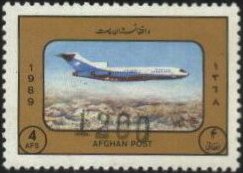Stamp: Jet over the Hindu Kush (Afghanistan 1996)
Jet over the Hindu Kush (Afghanistan 1996)
01 September (Afghanistan ) within release Tourism - surcharged goes into circulation Stamp Jet over the Hindu Kush face value 1,200 Afghan afghani
| Stamp Jet over the Hindu Kush in catalogues | |
|---|---|
| Stanley Gibbons: | Sg: AF 1290 |
Stamp is horizontal format.
1200 afghani on 4 afghani Issued during Taliban ruleAlso in the issue Tourism - surcharged:
- Stamp - Buzkashi Game, Horse (Equus ferus caballus) face value 900;
- Stamp - Great Friday Mosque, Herat face value 300;
- Stamp - Jet over the Hindu Kush face value 1,200;
- Stamp - Minaret of Jam face value 600;
Stamp Jet over the Hindu Kush it reflects the thematic directions:
An aircraft (pl. aircraft) is a vehicle that is able to fly by gaining support from the air. It counters the force of gravity by using either static lift or the dynamic lift of an airfoil, or, in a few cases, direct downward thrust from its engines. Common examples of aircraft include airplanes, rotorcraft (including helicopters), airships (including blimps), gliders, paramotors, and hot air balloons.Part 1 (Definitions and Abbreviations) of Subchapter A of Chapter I of Title 14 of the U. S. Code of Federal Regulations states that aircraft "means a device that is used or intended to be used for flight in the air."
Aviation is the practical aspect or art of aeronautics, being the design, development, production, operation and use of aircraft, especially heavier than air aircraft. The word aviation was coined by French writer and former naval officer Gabriel La Landelle in 1863, from the verb avier (synonymous flying), itself derived from the Latin word avis ("bird") and the suffix -ation.
Tourism is travel for pleasure or business; also the theory and practice of touring, the business of attracting, accommodating, and entertaining tourists, and the business of operating tours. Tourism may be international, or within the traveller's country. The World Tourism Organization defines tourism more generally, in terms which go "beyond the common perception of tourism as being limited to holiday activity only", as people "traveling to and staying in places outside their usual environment for not more than one consecutive year for leisure, business and other purposes". Tourism can be domestic or international, and international tourism has both incoming and outgoing implications on a country's balance of payments. Today, tourism is a major source of income for many countries, and affects the economy of both the source and host countries, in some cases being of vital importance.



